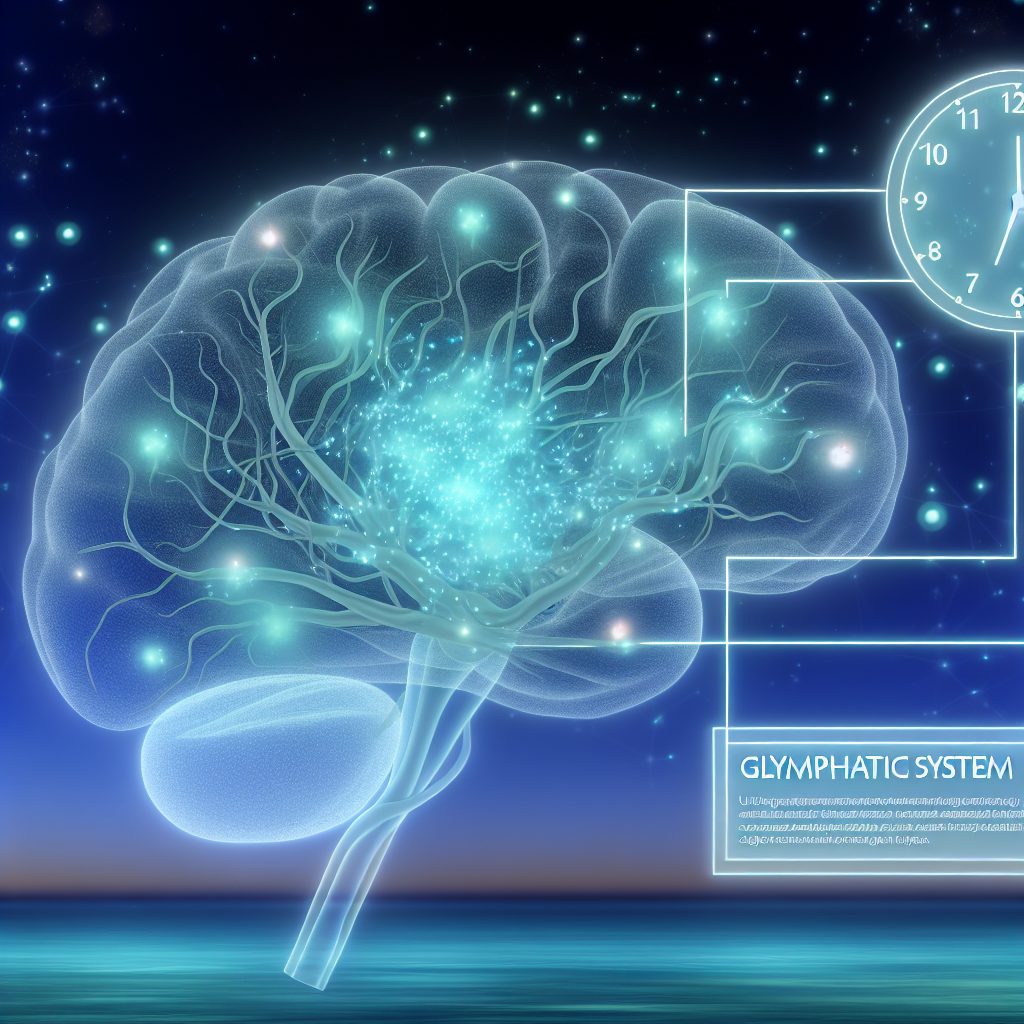Glymphatic System Enhancement: Targeted Approaches to Overnight Brain Detoxification
Sleep has long been considered nature’s most powerful remedy, a vital process for restoring both the body and mind. While many are aware of sleep’s role in improving mood, memory, and physical health, fewer people recognize the complex and fascinating biological processes that occur in the brain during slumber. Among these, the glymphatic system—a relatively newly discovered waste clearance pathway in the brain—plays a central role in overnight detoxification.
The glymphatic system is responsible for clearing metabolic waste and neurotoxins from the central nervous system during sleep. Understanding and enhancing this system has significant implications for improving brain health, longevity, and cognitive function.
The glymphatic system relies on glial cells to facilitate waste clearance, performing a function in the brain analogous to the lymphatic system in the rest of the body. During sleep, the brain’s interstitial space expands by up to 60%, allowing cerebrospinal fluid (CSF) to flow through and wash away toxins such as beta-amyloid and tau proteins—compounds associated with Alzheimer’s disease and other neurodegenerative conditions.
Modern lifestyle stressors—late-night screen exposure, irregular sleep schedules, poor diets, and lack of physical activity—are interfering with optimal glymphatic functioning. This raises a critical question: how can we support and enhance this vital system for long-term brain health?
Fortunately, emerging scientific research is shedding light on targeted strategies that can enhance glymphatic performance, promoting better cognitive resilience and more restorative sleep. From optimizing sleep posture and duration to using natural supplements and regulating circadian rhythms, these strategies offer a roadmap to better mental and neurological well-being.
How the Glymphatic System Works: A Nighttime Brain Cleanse
The discovery of the glymphatic system has revolutionized how medical professionals, neuroscientists, and sleep experts view the brain’s relationship with restful sleep. According to a landmark study published in Science (2013), the glymphatic system becomes dramatically more active during sleep, particularly during slow-wave (deep) stages. This phase enhances the exchange of cerebrospinal fluid (CSF) and interstitial fluid, helping eliminate neurotoxic waste products from the brain tissue.
One of the most compelling findings behind the glymphatic system is its relationship with neurodegenerative conditions. Research in JAMA Neurology (2020) found that disruptions in glymphatic functioning were linked to increased deposits of beta-amyloid plaques and tau protein tangles in the brain—key pathological markers of Alzheimer’s disease.
Sleep Position and Detox Depth: Why Sleeping on Your Side Matters
Posture during sleep also seems to impact glymphatic flow. A study conducted at the University of Rochester and published in The Journal of Neuroscience (2015) found that sleeping in a lateral (side) position significantly improved glymphatic transport compared with sleeping on the back or stomach. This might explain why humans—and even animals—naturally favor the side-sleeping position.
Move More, Sleep Better: Exercise and Glymphatic Activation
Lifestyle choices have a profound effect on the glymphatic system. A report published in Frontiers in Aging Neuroscience (2018) linked moderate aerobic exercise to improved CSF circulation and better sleep quality—two key contributors to efficient brain detoxification.
Likewise, dietary habits can improve glymphatic performance. Intermittent fasting and following a Mediterranean-style diet rich in antioxidants can lower neuroinflammation, offering indirect—but important—support for glymphatic functioning.
Tune Into Brain Health: Delta Wave Therapy and Circadian Support
On the therapeutic front, non-invasive approaches such as auditory stimulation using delta wave frequencies have shown promise in enhancing slow-wave sleep. Better slow-wave sleep equates to better glymphatic cleansing. Additionally, chronotherapy—adjusting exposure to light and tweaking sleep timing—helps align natural circadian rhythms and may further enhance this nocturnal detox process.
Pharmacological interventions are being researched, but most experts advocate for behavioral and natural strategies as the first line of support, given their safety and accessibility.
The Future of Brain Health Starts with Sleep
The glymphatic system represents a groundbreaking frontier in sleep science and brain health. By understanding how this natural detox system functions and the essential role it plays during restful sleep, individuals can take proactive steps toward improving cognitive performance, mental clarity, and long-term neurological resilience.
Whether by adjusting your sleep position, enhancing sleep hygiene, engaging in regular physical activity, or fine-tuning your circadian rhythm, the road to optimal glymphatic health is both accessible and rewarding.
As research continues to uncover the intricate relationships between sleep, the brain, and systemic health, one thing is abundantly clear—sleep is not a luxury; it is a biological necessity. Adequate, high-quality rest is not only the key to short-term rejuvenation but also the gatekeeper of your brain’s longevity and vitality.
Investing in the quality of your sleep is an investment in a clearer, healthier future. And thanks to the glymphatic system, we now better understand just why—and how—sleep truly heals.
References
- Xie, L., et al. (2013). Sleep Drives Metabolite Clearance from the Adult Brain. Science.
- Iliff, J. J., et al. (2012). A Paravascular Pathway Facilitates CSF Flow Through the Brain. Science Translational Medicine.
- Lee, H., et al. (2015). The Effect of Body Posture on Brain Glymphatic Transport. The Journal of Neuroscience.
- Shokri-Kojori, E., et al. (2018). β-Amyloid accumulation after one night of sleep deprivation. PNAS.
- Taoka, T. & Naganawa, S. (2020). Glymphatic imaging using MRI. Journal of Magnetic Resonance Imaging.
- Nedergaard, M., Goldman, S. A. (2020). Glymphatic failure and dementia. Science.
- Fultz, N. E., et al. (2019). Coupled CSF oscillations in human sleep. Science.
For more insights and cutting-edge developments in sleep health and brain function, visit us at medoze.com.
Concise Summary:
The glymphatic system is a recently discovered waste clearance pathway in the brain that plays a crucial role in overnight detoxification. It works by facilitating the flow of cerebrospinal fluid (CSF) to wash away toxins like beta-amyloid and tau proteins, which are associated with Alzheimer’s disease. Disruptions in glymphatic functioning have been linked to neurodegenerative conditions. Strategies like optimizing sleep position, exercise, and regulating circadian rhythms can enhance glymphatic performance, promoting better cognitive resilience and mental clarity. Understanding the glymphatic system and prioritizing quality sleep is key to long-term brain health.

Dominic E. is a passionate filmmaker navigating the exciting intersection of art and science. By day, he delves into the complexities of the human body as a full-time medical writer, meticulously translating intricate medical concepts into accessible and engaging narratives. By night, he explores the boundless realm of cinematic storytelling, crafting narratives that evoke emotion and challenge perspectives.
Film Student and Full-time Medical Writer for ContentVendor.com




